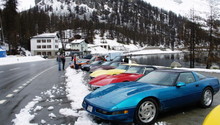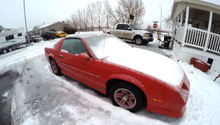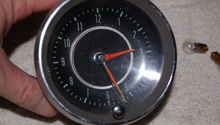Corvette: What are the Best Tire Modifications?
Corvettes out of the box are well-designed, but they may not meet your specific needs. Upgrade your tires to your personal specifications at a cost you can afford. You may also want to change your tires depending on the season and daily road conditions.
This article applies to the Corvette C5 (1997-2004), C6 (2005-2013), and C7 (2014-2015).
There are four main types of tires to choose from: summer tires (standard high performance tires), all-season tires, and winter tires. Keep in mind that these tires work best under specific conditions. For example, summer tires work best when it is warmer than 40 °F and in dry conditions. Drive them on snow or ice and you will risk hydroplaning or losing control of your car. You should also consider the benefits of installing wider tires. Generally, the wider your tires are the better your car's handling and brakes will be, but the wider your tires are the fewer miles per gallon you will get.

If you don't want your tires to pop out past the tire wells, go no wider than:
- 17x8.5 245/45-17 25.7 tall and 18x9.5 275/40-18 26.7 tall for a C5.
- 18x8.5 245/40-18 25.7 tall and 19x10 285/35-19 26.7 tall for a C6.
- 18x8.5 245/40-18 25.7 tall and 19x10 285/35-19 26.7 tall for a C7.
You can go as wide as 275/35ZR18 on your front tires and 325/30ZR19 on your rear tires if you don't want your tires to pop out. This also depends on your model and your normal driving conditions. Michelin and Bridgestone frequently rate the highest in surveys and tests for different types of tires.

Summer and High-Performance Tires
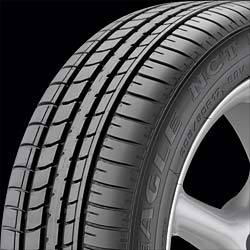
DIY Cost - $150+ per tire
Professional Cost - $205+ per tire
Skill Level - Easy; it is a simple tire swap.
Most manufacturers boast that their summer tires provide excellent handling and braking performance in dry conditions. Summer tires should also help you maintain high-speed stability, and you should notice more even wear across the tread. If used during Winter, they may not stop as well as they do when it is warm and may not respond well if you have to maneuver evasively. Most high-performance summer tires tires drive well under high speeds and increase your ride's stability without negatively affecting your Corvette's control.
All-Season Tires
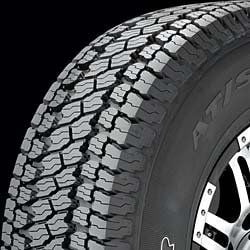
DIY Cost - $200+ per tire
Professional - $255+ per tire
Skill Level - Easy; it is a simple tire swap.
As the name suggests, all-season tires perform well in all types of weather conditions. Some all-season tires are designed to increase traction in cold temperatures and in wet conditions. Also, treads are thicker on all-season tires than on summer tires but most are designed to provide high-lateral grip and dry-cornering capability when driving fast on dry roads.
Winter Tires

DIY Cost - $200+ per tire
Professional Cost - $255+ per tire
Skill Level - Easy; it is a simple tire swap.
Winter tires allow you to safely drive in several inches of water or through light snow, while minimizing your risk for hydroplaning or losing control. You tend to hear more road noise driving on winter tires than on summer tires, and you will likely feel how the tires grip to the road more easily than you would riding on other types of tires. With winter tires, knowing you're less prone to an accident during the winter may be worth the trade-offs.
Run-Flat Tires

DIY Cost - $200+ per tire
Professional Cost - $255+ per tire
Skill Level - Easy; it is a simply tire swap.
Run-flat tires allow you to drive even if you lose tire pressure. Most manufacturers say you can drive between 70 and 90 miles at up to 50 mph even if you have lost air pressure or have punctured a tire. This can be useful especially if you don't have room to stow a spare. You can usually find run-flat versions of summer, all-season, winter, and high-performance tires.
Related Discussions and Site
- What Are the Widest Tires That Fit on a C6 Coupe - CorvetteForum.com
- Best Ultra High-performance Tires - CorvetteForum.com
- Corvette Snow Tires - CorvetteForum.com
- Is Anyone Installing Winter Tires on Their C7 With or Without Z51? - CorvetteForum.com
- C5 Winter Tires - CorvetteForum.com
- Can a Corvette be Driven on Summer Tires? - CorvetteForum.com
- How Cold is too Cold to Drive on C7 Summer Tires? - CorvetteForum.com
- Tire types - TireRack.com
- Widest Tire and Wheel Width for a C5 - CorvetteForum.com
- C6 Tech Performance - CorvetteForum.com

